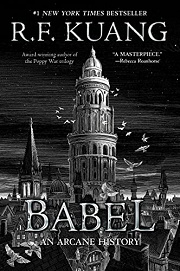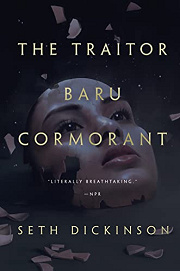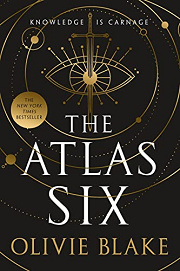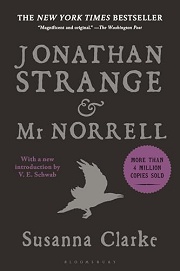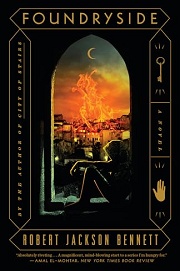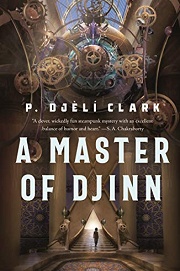Share your thoughts in a quick Shelf Talk!
Babel by R. F. Kuang
At a reimagined Oxford where language itself fuels magic, a brilliant translator confronts the price of power and the machinery of empire. With intoxicating worldbuilding and razor-sharp ideas, Babel turns the alchemy of words into a spellbinding fight for truth and justice.
Have you read this book? Share what you liked (or didn’t), and we’ll use your answers to recommend your next favorite read!
Love Babel but not sure what to read next?
These picks are popular with readers who enjoyed this book. Complete a quick Shelf Talk to get recommendations made just for you! Warning: possible spoilers for Babel below.
In Babel, did you enjoy ...
... anti-imperial resistance born from academia and the crushing compromises empire forces?
The Traitor Baru Cormorant by Seth Dickinson
If you were drawn to how Robin, Ramy, and Victoire channel their scholarship at Babel into clandestine action against the British Empire, you’ll be riveted by The Traitor Baru Cormorant. Baru weaponizes numbers and policy the way Robin wields silver and language—using the master’s tools from inside the system, with devastating personal costs. Like the Hermes Society’s chess game against Oxford and the Colonial Office, this book zeroes in on infiltration, betrayal, and the price of complicity when you try to break an empire from within.
... dark-academia camaraderie, rivalry, and betrayal inside an elite magical institute?
The Atlas Six by Olivie Blake
Loved the cohort dynamics of Robin, Ramy, Victoire, and Letty—late-night translations in the tower, fraying trust under ideological pressure, secrets bleeding into friendship? The Atlas Six puts six brilliant magicians into a high-stakes scholarly society where collaboration and competition blur. As in Babel’s seminar rooms and archive stacks, study is power—and the costs of admission may be blood. If the way the group’s loyalties splintered around the Hermes cause hooked you, the shifting alliances here will, too.
... footnote-rich, scholarly alt-history where academic canon and marginalia reshape the world?
Jonathan Strange and Mr Norrell by Susanna Clarke
If Kuang’s erudite footnotes—lexicons, etymologies, and sly scholarly asides—made Babel feel like a living archive, you’ll adore Jonathan Strange & Mr Norrell. Its playful, expansive footnotes turn history into a layered conversation, much like Babel’s lectures and treatises refract the silver-work’s power. And as with Robin’s Oxford—where research has geopolitical teeth—Norrell and Strange’s academic disputes echo across battlefields and empire.
... a rigorous, language-based magic system whose precise rules let words rewrite reality?
Foundryside by Robert Jackson Bennett
If the joy for you was Babel’s silver bars and translation pairs—how exact semantic shifts produce tangible effects—Foundryside scratches that itch. Its ‘scriving’ magic is a programmable language that convinces objects of new truths, echoing the way Robin’s inscriptions bend the world through meaning. Like the Hermes crew’s hacks and heists around Oxford’s vaults, Sancia’s break-ins and code-cracking reveal how rule-bound magic becomes a tool of capital and control—and how it can be subverted.
... anti-imperialist alternate history where magic rewires geopolitics and colonial power?
A Master of Djinn by P. Djèlí Clark
If you appreciated how Babel reimagines 1830s Britain—silver-work fueling imperial might, from Canton to Oxford—A Master of Djinn offers another vivid world where magic upends empire. In an alternate Cairo, Agent Fatma navigates politics, international tensions, and bureaucratic intrigue much like Robin confronting the Colonial Office’s designs. It’s the same heady mix of state power, occult technology, and the question of who benefits when the machinery of empire learns a new language.
Unlock your personalized book recommendations! Just take a quick Shelf Talk for Babel by R. F. Kuang. It’s only a few questions and takes less than a minute.
